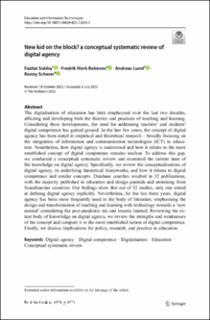New kid on the block? a conceptual systematic review of digital agency
Journal article, Peer reviewed
Published version

View/
Date
2023Metadata
Show full item recordCollections
- Publikasjoner fra Cristin [3362]
- SPS - Documents [427]
Original version
https://doi.org/10.1007/s10639-023-12038-3Abstract
The digitalisation of education has been emphasised over the last two decades,
affecting and developing both the theories and practices of teaching and learning.
Considering these developments, the need for addressing teachers’ and students’
digital competence has gained ground. In the last few years, the concept of digital
agency has been noted in empirical and theoretical research – broadly focusing on
the integration of information and communication technologies (ICT) in educa-
tion. Nonetheless, how digital agency is understood and how it relates to the more
established concept of digital competence remains unclear. To address this gap,
we conducted a conceptual systematic review and examined the current state of
the knowledge on digital agency. Specifically, we review the conceptualisations of
digital agency, its underlying theoretical frameworks, and how it relates to digital
competence and similar concepts. Database searches resulted in 32 publications,
with the majority published in education and design journals and stemming from
Scandinavian countries. Our findings show that out of 32 studies, only one aimed
at defining digital agency explicitly. Nevertheless, for the last three years, digital
agency has been more frequently used in the body of literature, emphasising the
design and transformation of teaching and learning with technology towards a ‘new
normal’ considering the post-pandemic era and lessons learned. Reviewing the ex-
tant body of knowledge on digital agency, we review the strengths and weaknesses
of the concept and compare it to the more established notion of digital competence.
Finally, we discuss implications for policy, research, and practice in education.
